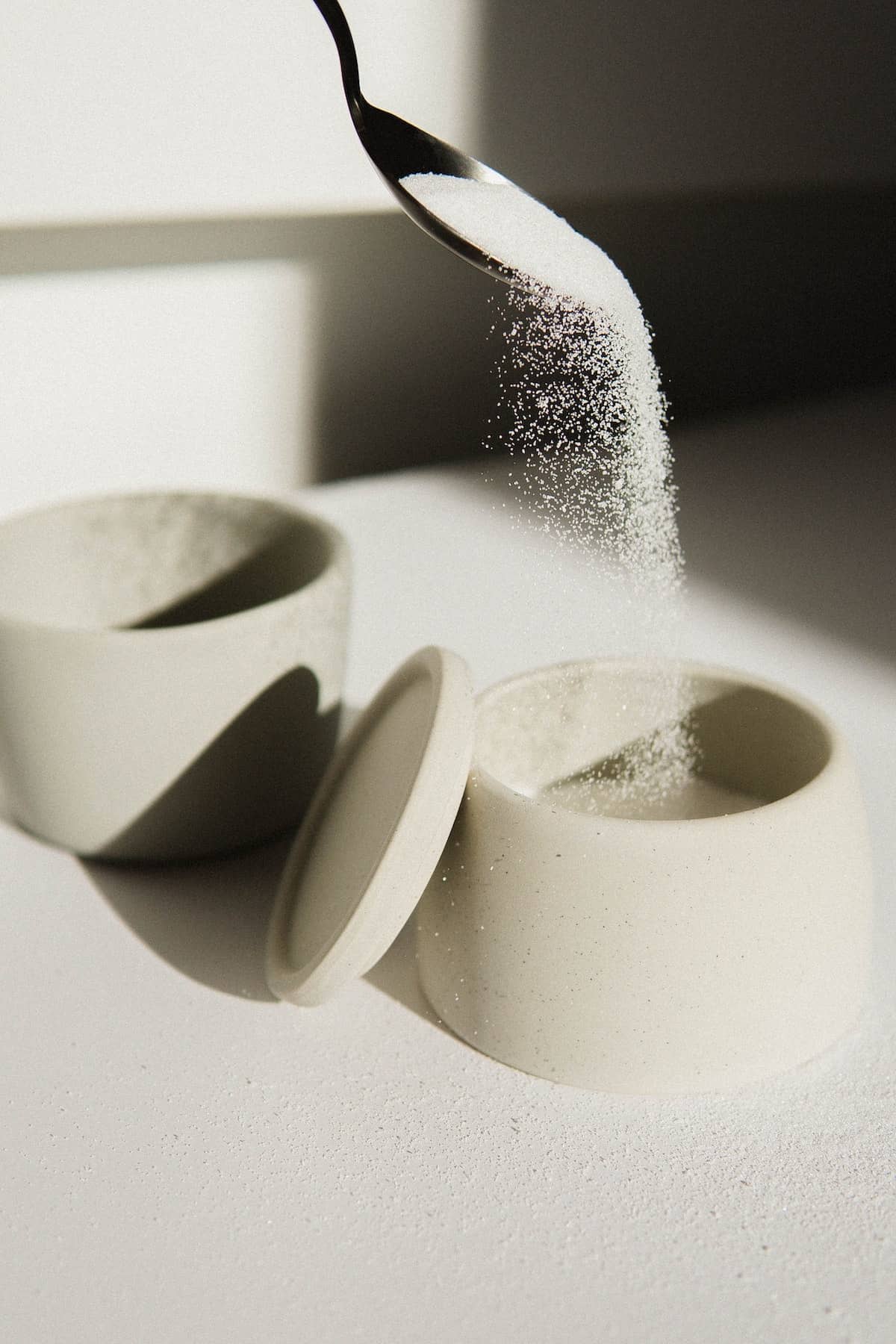Should You Use Erythritol If You Take Blood Thinners?
A recent study has raised concerns about the safety of erythritol, the non-nutritive sweetener in products like Swerve and Lakanto. Research has linked erythritol use to increased heart disease and stroke risk.
Like many other dietitians, I've used and recommended these products for quite a while. They’ve always been considered a safe option for anyone who wants to reduce sugar, carbs, and calories. And I always thought they could be part of a heart-healthy diet.
So I wanted to look closely at the research and what health experts are saying, especially about the risk of blood clotting and erythritol, so I can share it here.
Here's what you should know about erythritol and heart disease risk and who should be especially cautious about using it.
What is Erythritol?
Erythritol is a zero-calorie sugar alcohol sweetener. It’s in the same family as sorbitol and xylitol, often used to sweeten sugar-free candy or chewing gum. Sorbitol and xylitol can cause gas, bloating, and diarrhea in people with sensitive digestive tracts (as with IBS) or in anyone who eats too much.
But erythritol doesn’t cause those side effects, and most people tolerate it without any problem. It provides no extra calories or carbohydrates. Therefore, it doesn’t raise blood sugar or insulin. It’s also a top sweetener for anyone on a keto or low-carb diet with a sweet tooth.
Erythritol has a nice, sweet flavor that’s similar to sugar. Like sugar, it also gives baked goods structure and helps them brown. So it’s a go-to ingredient for bakers (at home and in bakeries worldwide) and anywhere you want to add sweetness without sugar. Another plus is that it’s a “natural” no-calorie sweetener made by fermenting sugar from corn instead of from chemicals in a lab.
Over 180 different sweeteners contain erythritol, either by itself or in a blend with monk fruit, stevia, or other sweeteners. It’s approved for use in more than 60 countries. Swerve and Lakanto have long been my two favorite sugar-free sweeteners; both contain erythritol.
Decades of research have shown that erythritol is safe and doesn’t increase your risk of health problems. Until now. So yes, I’m crying!

What Does The Research Show?
A study out of Cleveland Clinic on about 4,000 people found that those with risk factors for heart disease (like diabetes or high cholesterol) were twice as likely to have a heart attack or stroke if they had large amounts of erythritol in their blood.
In this study, the researchers dug deeper after they noticed the erythritol-cardiovascular disease link. They wanted to find out what it was about erythritol that affected the risk. So they tested blood in the lab to see what happened when they added erythritol.
They found that erythritol causes blood to clot. A lot. Essentially, this research study found that eating 30 grams of erythritol stimulates your platelets excessively so that they clump together and clot like crazy. And the effect can last several days.
30 grams is a lot, but it’s not an unrealistic amount. It’s about the amount of sweetener in a pint of keto or zero-sugar ice cream.
Erythritol and Blood Clotting
It’s normal for your blood to clot. Everyone has platelets, tiny blood cells that clump together and help your blood clot so you don’t bleed excessively.
However, too much clotting can be dangerous in someone with heart disease because a clot can block already narrow arteries, cutting off the blood supply to your heart or brain. That could result in a heart attack or stroke.
Millions of people at risk for cardiovascular disease take blood thinners (anticoagulants) or anti-platelet medications to prevent blood from clotting too much. These medicines slow down your body’s process of making blood clots or they prevent platelets from sticking together. They don’t actually thin your blood. And they don’t break up any existing clots.
According to this study, erythritol seems to stimulate your platelets to clot excessively, doing the exact opposite thing that you want your blood thinner medication to do. Therefore, it’s essential to talk to your doctor and ask if you should avoid erythritol if you’re at risk for heart problems or taking a blood thinner.
Chances are, they'll tell you to toss any sweeteners with erythritol. Or at least use them very sparingly.
Should You Avoid Erythritol?
Frankly, researchers were surprised by their findings. They weren’t looking at erythritol. They were looking to see if there was a compound in people’s blood that predicted their future heart attack or stroke risk. Unfortunately, the compound that jumped out at them was erythritol.
It’s easy to jump to conclusions here. But there are a few things to understand about this study and why the results may not apply to everyone.
- Just because erythritol was associated with higher cardiovascular disease risk doesn’t mean it causes heart attacks and strokes. There were likely many other factors contributing to the higher risk.
- The people in the study were older (60s-70s), mostly overweight, and already at risk for heart disease and stroke. So it’s impossible to say if younger, healthy people would have the same risk results.
- There might have been other aspects of the participant's diets that increased the risk of cardiovascular disease. For example, people who ate the most erythritol might also have had lots of unhealthy fats or too little fiber in their diet, and that contributed to their risk.
I’ve been reading many comments on this study from health experts. For the most part, they agree small amounts of erythritol-based sweeteners are probably not harmful to healthy people or people with low to average heart disease risk.
But if you have a diagnosis of cardiovascular disease, a-fib (irregular heartbeat), or a health condition like diabetes that increases your risk of a heart attack or stroke, you might want to think twice. Regularly adding this sweetener to your coffee, tea, cake batter, or anything else might stir up trouble.
And if you take a blood thinner medication to prevent blood clots, you should avoid erythritol because it works counter to your medication.
Until we have more research and answers, I recommend limiting sweeteners that contain erythritol. And you probably should avoid it altogether if you’re at risk for blood clots.
What Foods Have Erythritol?
While a little bit here and there might be OK, you might unknowingly eat much more than you think. Erythritol is widely used by food manufacturers today in many low-calorie, reduced-sugar, and keto products.
The tricky thing is that you might not always see it listed as an ingredient because it’s not required. It might appear on the nutrition facts label as “sugar alcohol.” Or the label might say “artificially sweetened with natural products” or “zero sugar.”
Erythritol is in products like:
- Zero sugar or reduced sugar sweeteners like Swerve, Lakanto, Splenda Naturals, Truvia
- Keto ice creams, snack or energy bars, and baked goods (cookies, cakes, etc)
- No sugar or reduced calories beverages like sodas, iced tea, and smoothies
- Low carb yogurts
- Protein powders
- Natural toothpaste
What to Eat Instead
I’ve always been a proponent of real food instead of foods that contain processed ingredients. So instead of finding other sugar-free sweeteners that might be safe, I’m sticking with my EAT REAL FOODS recommendation here. Try these tips:
- If you need something sweet after a meal, eat a bowl of fresh berries or a slice of watermelon or pineapple.
- If you sweeten your morning coffee or tea with a zero-calorie sweetener, switch to a teaspoon or less of natural sugar or honey. Over the course of the next few months, gradually cut that back until you don’t need any sweetener.
- If you drink sweetened beverages throughout the day, make a pitcher of herbal sun tea and sip on that instead. Many flavors, like hibiscus or elderberry, have naturally sweet essence without any sugar or sweetener.
- If you love to bake, use regular sugar or a blend of sugar and zero-calorie sweetener, and bake less often. Keep fruit and nut bars or other energy bites on hand for when you need a healthier sweet treat.
The human body is not designed to process artificial ingredients and additives, even if they are naturally derived. It’s time to tame your sweet tooth and eat more whole foods. If you need help, check out my article on How to Quit Your Sugar Cravings.
Making the shift can be challenging, and it takes time to adjust and find the foods that satisfy you. But do it gradually, and I promise you’ll get there!


Another interesting (though obviously not unbiased!) take on this is at https://www.lakanto.com/blogs/food-nutrition/erythritol-risk
Thanks for sharing Scott! I agree there are pros and cons (and so many things still to learn) about these sweeteners.